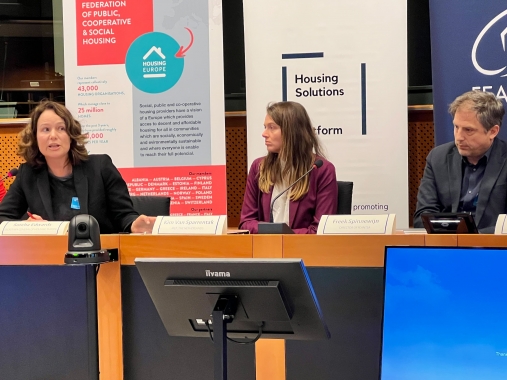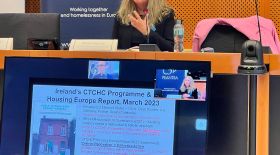Putting EU funds to housing for homelessness prevention
Press release about the Housing Solutions Platform debate at the European Parliament
Brussels, 27 March 2023 | Published in Economy, Social
On March 27, MEP Kim van Sparrentak hosted a session organised by the Housing Solutions Platform to debate the enormous potential of already existing EU funds to prevent and address homelessness. FEANTSA, Housing Europe, Fondation Abbé Pierre, and Habitat for Humanity - the organisations leading the Platform that connects people, ideas, and tools to improve housing conditions - called for an increase of the use of funds to prevent and address extreme vulnerability and to ensure that European financing is used by agents who have proved with their work and commitment that they truly want our society to do better.
MEP Kim van Sparrentak from the Greens party stressed that as a result of the social impact of the pandemic and the cost of living crisis we have seen that homelessness has kept on rising. To her, in order to achieve the goal to end homelessness by 2030 that has been agreed in the Lisbon declaration signed by all member states and EU institutions “we need to double down our efforts. More and more effective EU level investment will be key in order to speed up efforts to move to a housing based approach to combating homelessness”, she added.
Being the Brussels voice of social and affordable housing providers, the Secretary General of Housing Europe, Sorcha Edwards pointed out that “we must ensure that making use of EU funds is not just another plaster to a big societal wound such as homelessness.” She said: “the #Housing2030 report by Housing Europe and the UN shows how good governance managed to work well on both strands, tackling the pressing matters to take people off the streets but also ensuring that we have more affordable homes and support for social housing providers so that they can react as they should and would like to.”
The Director of FEANTSA - the organisation fighting against homelessness - Freek Spinnewijn also highlighted that we need better recognition of the critical role that European funds play in addressing homelessness and housing exclusion. “Affordable housing is the cornerstone of effective prevention, and we need targeted public policies that prioritize its development. FEANTSA and its partner organisations have developed the Housing Solutions Platform with this aim: identify and promote housing solutions for the locked out. We believe this debate is a source of inspiration for decision-makers to support solutions that deliver impact on the ground.”
Amaral Cunha Vasco, Loan Officer for Poland and the Baltic States at the European Investment Bank illustrated how Poland has combined different EU funds to increase the stock of social rental housing and combat social exclusion. EIB also stressed that cooperation with different policy levels can bring change. Poland’s neighbouring country, Germany showed how indispensable the work with the community is in real life. Dieter Breuer from the Initiative Bauen
Wohnen Arbeiten (IBWA) in Cologne has relied on building communities as a tool to support the social reintegration process through group work, common areas, and participative decision-making. IBWA has put together the guide “Self-representation of homeless people” to bridge the gap between service providers, policymakers and homeless citizens.
In an upcoming report, Housing Europe’s Observatory has also found out that homes that are voluntarily kept empty for a period longer than six months can put additional pressure on cities, additionally exacerbating the housing crisis. In some cases, long-term vacant housing is a result of efforts to artificially constrain supply, speculate with capital, or have unrealistic price expectations. Housing Europe’s Research Director, Alice Pittini called on policymakers “to properly understand why housing is remaining vacant, ensure that the definition for it is fit for purpose, and ensure that the tools to deal with it are well-adapted to the local context.” The study has been commissioned by the Heritage Council of Ireland’s Collaborative Town Health Centre Check Programme and will be released in spring 2023.
Rick Hathaway, Habitat for Humanity Vice President, Europe and the Middle East further added that “Central and Eastern Europe is at its turning point. The provision of affordable housing for low-income and vulnerable groups, including Ukrainian refugees and people experiencing homelessness, is at the top of the political agenda. Promising best practices, such as the renovation of empty spaces, repurposing of buildings for residential use, as well as creation of social rental agencies to manage the housing stock and provide people with integrated support, should be systemically implemented. We call on the EU to allocate extra funds to scale up these successful initiatives.”
“The fight against poverty and social exclusion must include an ambitious housing policy: whether it is to fight homelessness by promoting housing first, or to fight fuel poverty through targeted renovation programmes. These policies must be supported by the European Union through the use of European funds to lead to a real change,” Sarah Coupechoux, in charge of EU affairs at the Abbé Pierre Foundation said in conclusion.
Keeping in mind that the third meeting of the European Platform for Combatting Homelessness was running in parallel, speakers on the panel reaffirmed their expectations for this new setting to tackle the causes, provide more transparent data on the homelessness phenomenon, and learning opportunities that can give local actors the means to cope with the crisis.
Who is who?
Housing Solutions Platform
The Housing Solutions Platform is an expertise- and practice-driven initiative to identify, debate and promote innovative solutions for affordable housing in Europe. https://www.housing-solutions-platform.org/
Feantsa
FEANTSA is the European Federation of National Organisations Working with the Homeless. We are the only European NGO focusing exclusively on the fight against homelessness. Our ultimate goal is an end to homelessness in Europe. Established in 1989, FEANTSA brings together non-profit services that support homeless people in Europe. We have over 120 member organisations from 30 countries, including 27 Member States. https://www.feantsa.org/
Housing Europe
Housing Europe is the European Federation of Public, Cooperative and Social Housing. Established in 1988, it is a network of 46 national and regional federations which together gather about 43,000 public, social and cooperative housing providers in 25 countries. Altogether they manage around 25 million homes. They do not just provide affordable homes but a number of other services such as domiciliary care, neighbourhood services or urban regeneration. https://www.housingeurope.eu/
Habitat for Humanity International
Driven by the vision that everyone deserves a decent place to live, Habitat for Humanity International is an international NGO that helps individuals and families achieve the strength, stability and self-reliance through decent and affordable shelter. With a presence in nearly 70 countries, our work includes residential energy efficiency; incremental housing support services; basic services such as water and sanitation, security of tenure, resilient and sustainable construction; inclusionary financing; community development; and policy advocacy. https://www.habitat.org/emea
Foundation Abbé Pierre
Located in France, the Foundation Abbé Pierre works on a daily basis against bad housing: its headquarters are located in Paris and it has 9 territorial agencies (Ile-de-France, Nord Pas-de-Calais, Brittany, Rhône-Alpes, Provence Alpes Côte d'Azur, Réunion Island, Languedoc Roussillon, Alsace Lorraine, Aquitaine). All in all, the Foundation counts 129 employees and 250 volunteers over 13 locations. https://www.fondation-abbe-pierre.fr/en/


